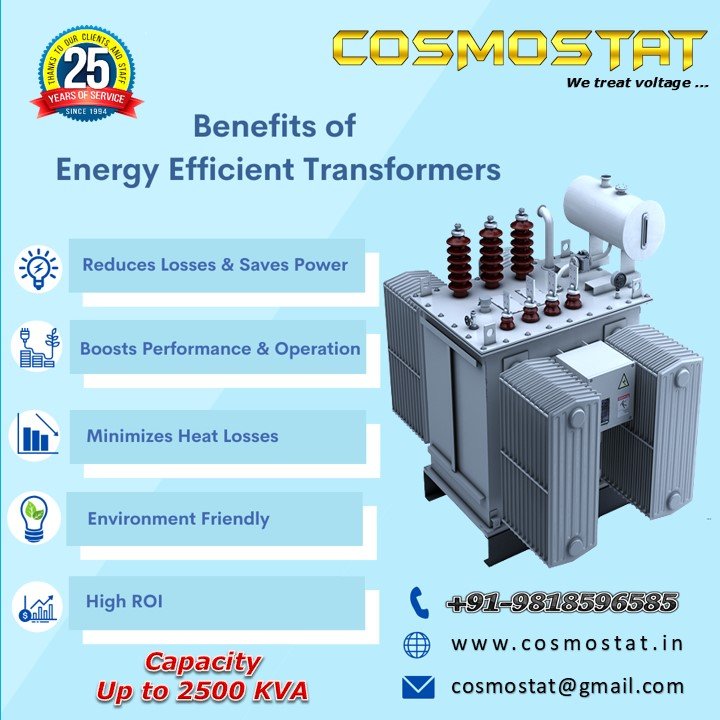
Reduced Energy Consumption: Energy-efficient transformers are designed to minimize energy losses during power transmission and distribution. They have higher efficiency ratings, which means they convert a higher percentage of the electrical energy into usable output power. This leads to reduced energy consumption and lower electricity bills.
Cost Savings: By reducing energy losses, energy-efficient transformers help save on electricity costs. The lower energy consumption translates into financial savings over the transformer's lifespan, making it a cost-effective choice.
Environmental Impact: With reduced energy consumption, energy-efficient transformers contribute to a lower carbon footprint. They help mitigate greenhouse gas emissions and support sustainability efforts, making them environmentally friendly.
Enhanced Equipment Lifespan: Energy-efficient transformers operate at cooler temperatures due to reduced losses. This reduces stress on the transformer's components, resulting in less wear and tear. As a result, the transformer and other connected equipment, such as motors and electrical systems, can have a longer operational lifespan.
Improved Voltage Regulation: Energy-efficient transformers are designed to maintain more stable and accurate voltage levels, ensuring optimal performance of electrical equipment. This helps prevent voltage fluctuations and enhances the overall efficiency and reliability of the electrical system.
Overload Capability: Energy-efficient transformers often have better overload capacity and can handle temporary power surges or increased loads more effectively. This improves the resilience and flexibility of the electrical system, reducing the risk of equipment damage or failures.
Compliance with Regulations: Energy-efficient transformers meet or exceed energy efficiency standards set by regulatory bodies. By using these transformers, businesses can ensure compliance with energy efficiency regulations and demonstrate their commitment to sustainability.
Long-Term Cost Savings: While energy-efficient transformers may have a higher upfront cost compared to standard transformers, the long-term cost savings resulting from reduced energy consumption can outweigh the initial investment. The savings in energy bills over the lifespan of the transformer make it a financially beneficial choice.
Improved Power Quality: Energy-efficient transformers often have better insulation and superior voltage regulation, resulting in improved power quality. They help minimize voltage drops, voltage fluctuations, and harmonic distortions, ensuring a stable and clean power supply to connected equipment.
Reduced Heat Generation: Energy-efficient transformers generate less heat due to their improved design and reduced energy losses. This not only contributes to their higher efficiency but also helps in maintaining cooler operating temperatures within the electrical system, reducing the need for additional cooling mechanisms.
Enhanced System Reliability: With their efficient operation and improved voltage regulation, energy-efficient transformers contribute to overall system reliability. They help prevent voltage sags, spikes, and other power-related issues that can impact the performance and lifespan of connected equipment.
Noise Reduction: Energy-efficient transformers often incorporate advanced insulation materials and design features that help reduce noise levels generated during operation. This can be beneficial in environments where noise reduction is a priority, such as residential areas or noise-sensitive applications.
Voltage Stability: Energy-efficient transformers are designed to maintain more stable voltage levels even under varying load conditions. This helps prevent equipment malfunctions or damage caused by voltage fluctuations, ensuring consistent and reliable operation.
Adherence to Green Building Standards: Energy-efficient transformers align with green building standards and certifications, such as LEED (Leadership in Energy and Environmental Design). Using these transformers can contribute to achieving sustainability goals and obtaining green building certifications.
Technological Advancements: Energy-efficient transformers often incorporate advanced technologies, such as better core materials, advanced winding techniques, and digital monitoring capabilities. These advancements enable improved performance, diagnostics, and remote monitoring, leading to better control and maintenance of the electrical system.
By utilizing energy-efficient transformers, businesses can enjoy benefits such as improved power quality, reduced heat generation, enhanced system reliability, noise reduction, voltage stability, adherence to green building standards, access to technological advancements, and overall operational efficiency.
